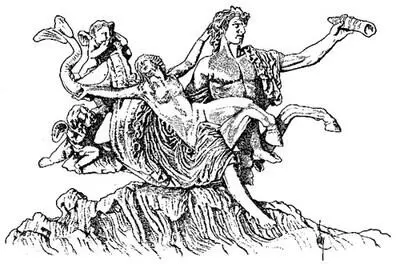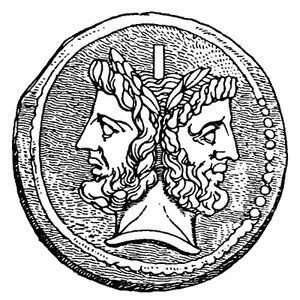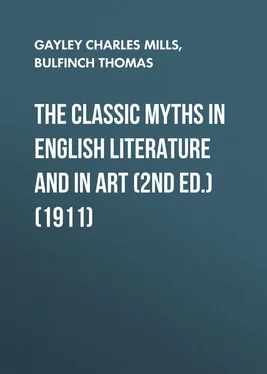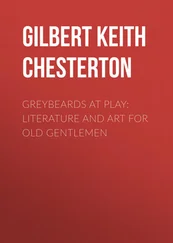Thomas Bulfinch - The Classic Myths in English Literature and in Art (2nd ed.) (1911)
Здесь есть возможность читать онлайн «Thomas Bulfinch - The Classic Myths in English Literature and in Art (2nd ed.) (1911)» — ознакомительный отрывок электронной книги совершенно бесплатно, а после прочтения отрывка купить полную версию. В некоторых случаях можно слушать аудио, скачать через торрент в формате fb2 и присутствует краткое содержание. Жанр: foreign_antique, foreign_prose, на английском языке. Описание произведения, (предисловие) а так же отзывы посетителей доступны на портале библиотеки ЛибКат.
- Название:The Classic Myths in English Literature and in Art (2nd ed.) (1911)
- Автор:
- Жанр:
- Год:неизвестен
- ISBN:нет данных
- Рейтинг книги:4 / 5. Голосов: 1
-
Избранное:Добавить в избранное
- Отзывы:
-
Ваша оценка:
- 80
- 1
- 2
- 3
- 4
- 5
The Classic Myths in English Literature and in Art (2nd ed.) (1911): краткое содержание, описание и аннотация
Предлагаем к чтению аннотацию, описание, краткое содержание или предисловие (зависит от того, что написал сам автор книги «The Classic Myths in English Literature and in Art (2nd ed.) (1911)»). Если вы не нашли необходимую информацию о книге — напишите в комментариях, мы постараемся отыскать её.
The Classic Myths in English Literature and in Art (2nd ed.) (1911) — читать онлайн ознакомительный отрывок
Ниже представлен текст книги, разбитый по страницам. Система сохранения места последней прочитанной страницы, позволяет с удобством читать онлайн бесплатно книгу «The Classic Myths in English Literature and in Art (2nd ed.) (1911)», без необходимости каждый раз заново искать на чём Вы остановились. Поставьте закладку, и сможете в любой момент перейти на страницу, на которой закончили чтение.
Интервал:
Закладка:
51.Of the Younger Dynastyof the waters Neptune and Amphitrite were the founders. Neptune's palace was in the depths of the sea, near Ægæ in Eubœa; but he made his home on Olympus when he chose. The symbol of his power was the trident, or three-pronged spear, with which he could shatter rocks, call forth or subdue storms, and shake the shores of earth. He created the horse and was the patron of horse races. His own steeds were brazen-hoofed and golden-maned. They drew his chariot over the sea, which became smooth before him, while dolphins and other monsters of the deep gamboled about his path. In his honor black and white bulls, white boars, and rams were sacrificed.

Fig. 41. Wedding of Poseidon and Amphitrite
52. The Lesser Divinities of the Waters 60 60 For genealogical table, see Commentary.
were:
1. Triton , the son of Neptune and Amphitrite, trumpeter of Ocean. By his blast on the sea-shell he stirred or allayed the waves.
2. Proteus , an attendant and, according to certain traditions, a son of Neptune. Like Nereus, he was a little old man of the sea. He possessed the prophetic gift and the power of changing his shape at will.
3. The Harpies , foul creatures, with heads of maidens, bodies, wings, and claws of birds, and faces pale with hunger. They are the offspring of Thaumas, a son of Pontus and Gæa.
4. The uncanny offspring of Phorcys and Ceto, – children of Pontus, – who rejoiced in the horrors of the sea:
a. The Grææ , three hoary witches, with one eye between them which they used in turn.
b. The Gorgons , whose glance was icy death.
c. The Sirens , muses of the sea and of death, who by their sweet singing enticed seafarers to destruction.
d. Scylla , also destructive to mariners, a six-headed monster whose lower limbs were serpents and ever-barking dogs.

Fig. 42. Triton carrying off a Nymph
5. Atlas , who stood in the far west, bearing on his shoulders the vault of heaven. He was once regarded as a divinity of the sea, but later as a mountain. He was the son of Iapetus and the father of three classes of nymphs, – the Pleiads, the Hyads, and, according to some stories, the Hesperids. The last-mentioned, assisted by their mother Hesperis and a dragon, guarded the golden apples of the tree that had sprung up to grace the wedding of Jove and Juno. The daughters of Atlas were not themselves divinities of the sea.
6. The Water-Nymphs. Beside the Oceanids and the Nereïds , who have already been mentioned, of most importance were the Naiads , daughters of Jupiter. They presided over brooks and fountains. Other lesser powers of the Ocean were Glaucus, Leucothea, and Melicertes, of whom more is said in another section.
In the following statement of the difference between ancient and modern conceptions of nature, the poet lends new charm to the fabled rulers of the sea.
The world is too much with us; late and soon,
Getting and spending, we lay waste our powers:
Little we see in Nature that is ours;
We have given our hearts away, a sordid boon!
This sea that bares her bosom to the moon;
The winds that will be howling at all hours,
And are upgathered now like sleeping flowers;
For this, for everything, we are out of tune;
It moves us not. – Great God! I'd rather be
A Pagan suckled in a creed outworn;
So might I, standing on this pleasant lea,
Have glimpses that would make me less forlorn;
Have sight of Proteus rising from the sea;
Or hear old Triton blow his wreathèd horn. 61 61 Wordsworth, Miscellaneous Sonnets.
CHAPTER VI
THE ROMAN DIVINITIES
53. Gods Common to Greece and Italy.Of the deities already mentioned, the following, although they were later identified with certain Greek gods and goddesses 62 62 Names of the corresponding Greek divinities are in parentheses.
whose characteristics and adventures they assumed, had developed an independent worship in Italy: Jupiter (Zeus); Juno (Hera); Minerva (Athene); Diana (Artemis); Mars (Ares); Venus (Aphrodite); Vulcanus, or Mulciber (Hephæstus); Vesta (Hestia); Mercurius (Hermes); Neptunus (Poseidon); Ceres (Demeter); Liber (Bacchus); Libera (Persephone); Magna Mater, the great mother of the gods (Rhea, Cybele); Orcus (Pluto, Hades); Tellus, the Earth (Gæa).
54. Italian Gods.There were also divinities always peculiar to Roman mythology. 63 63 For illustrative material, see Commentary.
Of these the more important are:
1. Saturn , an ancient Italian deity (as his name indicates) of seeds and sowing, the introducer of agriculture. Fanciful attempts were made to identify him with the Grecian god Cronus; and it was fabled that after his dethronement by Jupiter he fled to Italy, where he reigned during the Golden Age. In memory of his dominion, the feast of Saturnalia was held every year in the winter season. Then all public business was suspended; declarations of war and criminal executions were postponed; friends made presents to one another; and even slaves were indulged with great liberties. A feast was given them at which they sat at table while their masters served, to show the natural equality of men, and that all things belonged equally to all in the reign of Saturn. The wife of Saturn was Ops , goddess of sowing and harvest (later confounded with Rhea). Another Roman deity of earth was Consus , whose name means "the keeper of the stores." He is the god of the stored-up harvest; and his altar is said to have been discovered underground by Romulus. It was in the Circus Maximus and was uncovered only on the days of his festivals, the harvest home of August and the granary feast of December. The underground altar is a reminiscence of the ancient custom of storing corn underground or at any rate of burying the sacrifices offered to deities of the earth. The harvest festival was celebrated with horse races, which, originating in a very simple way with the primitive farmers, became in time the distinctive feature of the Circus Maximus.

Fig. 43. Bearded Janus
2. Janus , whose name is derived from the Latin root which means "going" and is connected with janua , a passage or door, is the most distinctive and most important of the native Italic deities. He is not only the god of doors, or material openings, but more truly of beginnings, – especially of good beginnings which insure good endings. Hence undoubtedly he is represented as facing both ways; for the Romans very properly believed that beginning and ending were of the same piece, and that an undertaking ill begun could not achieve success. His temple, or covered passage, in the Forum had doors facing east and west for the beginning and ending of the day; and between stood his two-faced statue. In every home the morning prayer was addressed to him; in every domestic enterprise his assistance was implored. He was the god, also, of the opening year; hence his month, January, on the first day of which words only of good omen were uttered, and gifts were given ( strenae , a name still preserved in the French word for New Year's presents, étrennes ), and, for good luck, some stroke of work was bestowed on every undertaking planned for the year. He was publicly invoked not only on New Year's day, but on the first day of each month, by priests and people alike; and in these prayers his name was mentioned even before that of Jupiter. He is the god of civilization, and is sometimes called Consivius, or the Sower. 64 64 Gellius, 5, 12. Ovid, Fasti, 1, 179. Macrobius, Sat. 1, 9-15.
Of course he was invoked when wars were commenced. And during their progress the doors of his temple stood always open. In peace they were closed; but they were shut only once between the reign of Numa and that of Augustus. It was natural that his worship should gradually absorb that of Sol, the Sun, who opens the day and completes the year and blesses with his rays the seeds that are sown; and such was the case. But Janus and his wife Jana were not originally connected even in name with Dianus (Sol, Apollo) and Diana (the moon).
Интервал:
Закладка:
Похожие книги на «The Classic Myths in English Literature and in Art (2nd ed.) (1911)»
Представляем Вашему вниманию похожие книги на «The Classic Myths in English Literature and in Art (2nd ed.) (1911)» списком для выбора. Мы отобрали схожую по названию и смыслу литературу в надежде предоставить читателям больше вариантов отыскать новые, интересные, ещё непрочитанные произведения.
Обсуждение, отзывы о книге «The Classic Myths in English Literature and in Art (2nd ed.) (1911)» и просто собственные мнения читателей. Оставьте ваши комментарии, напишите, что Вы думаете о произведении, его смысле или главных героях. Укажите что конкретно понравилось, а что нет, и почему Вы так считаете.












